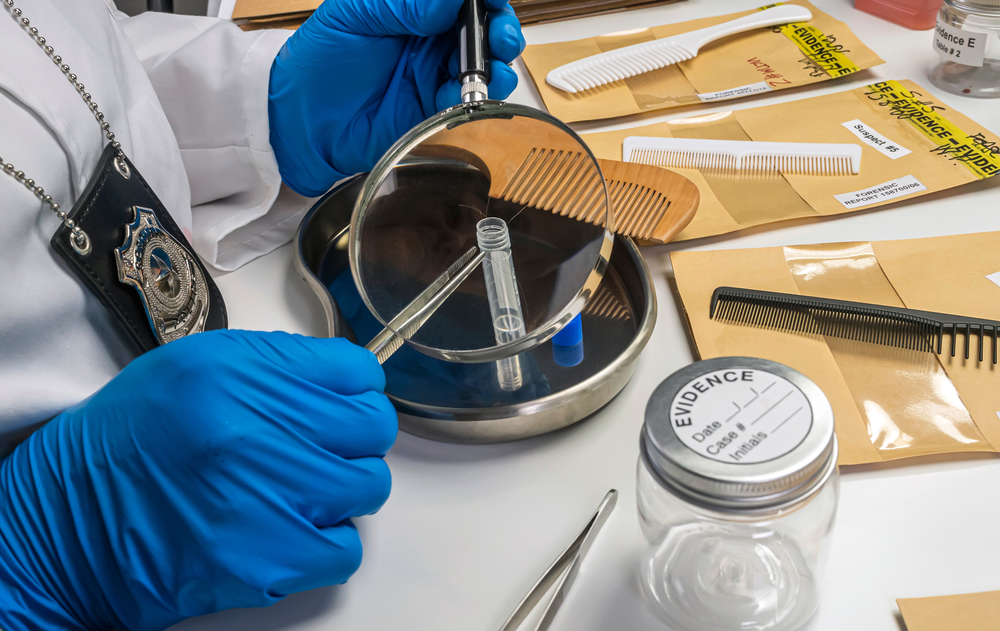Key Highlights:
- ‘Criminal Justice’ is a broad umbrella term used by many universities and colleges to refer to all their degree programs related to criminal and legal studies.
- However, in professional settings, criminology, criminal justice, and criminalistics are distinct disciplines.
- Criminology primarily focuses on the causes of crimes and criminal behavior.
- Criminal justice mainly centers around the study of the justice system – law enforcement, the judiciary, corrections, etc.
- Criminalistics deals with the application of scientific techniques to investigate and solve crimes.
If you are passionate about justice, community welfare, and public safety, then you may already know that there are many paths that can help you fulfill your ambitions. Whether you’re still in school or are already in a law enforcement or military career, earning a degree in criminal studies can be a great step to help you achieve your goals. Broadly, there are three main disciplines you can choose from in this area: criminology, criminal justice, and criminalistics. Though these three disciplines are similar, and sometimes used interchangeably, there are distinctions that make each of them unique.
By the end of this article, you’ll have a clearer understanding of these disciplines and, hopefully, a better sense of which path aligns best with your goals.
What is Criminology?
Criminology is the study of crime and criminal behavior, including its causes, correction, and prevention. It is a multidisciplinary field that involves concepts from social sciences, such as sociology, psychology, political science, etc.
Criminologists study the nature and origins of crimes, social reactions to crime, and the functioning of law enforcement agencies. They also examine relationships between victims and criminals and the role of victims in criminal events (which is referred to as victimology).

What Can I Learn From a Criminology Program?
According to the National Center for Education Statistics’ (NCES) Classification of Instructional Programs (CIP), a criminology program is defined as:
A program that focuses on the systematic study of crime as a sociopathological phenomenon, the behavior of criminals, and the social institutions evolved to respond to crime. Includes instruction in the theory of crime, psychological and social bases of criminal behavior, social value systems and the theory of punishment, criminal law and criminal justice systems, penology, rehabilitation and recidivism, studies of specific types of crime, social attitudes and policy, and applications to specific issues in law enforcement administration and policy.
A criminology program can provide students with a comprehensive understanding of crime and criminal behavior, as well as the social, political, psychological, and other factors that may contribute to it. Here are some of the things you can learn from a criminology program:
- Theories on Crime:
This includes exposure to various theories that attempt to explain why people commit crimes, such as strain theory, social learning theory, and rational choice theory. They will also learn about the strengths and weaknesses of each theory and how they can be applied to real-world situations. - Criminal Justice System:
This subject gives you a better understanding of how the criminal justice system works, including the roles of law enforcement, courts, and corrections. As part of this subject, students also get to learn about the challenges that exist within the system. - Research Methods:
Most criminology programs give students the opportunity to learn about the different research methods used in criminology, such as surveys, experiments, and observational studies. They also get to learn how to analyze and interpret the collected data.
- Applied Criminology:
Some criminology programs focus on the practical application of criminological research to real-world problems. Students may learn about crime prevention strategies, restorative justice practices, and other ways in which criminology can be used to improve the criminal justice system and reduce crime. - Sociocultural Context:
A few criminology programs emphasize the importance of understanding how social inequality and diversity affect crime and criminal justice. Through these classes, you can learn how race, class, gender, and other factors may influence crimes and how these are treated by the criminal justice system.
Criminology programs can thus provide you with a broad range of knowledge and skills that can be applied to a variety of careers in criminal justice, law enforcement, social services, and other related fields.
What is Criminal Justice?
Criminal Justice (commonly called CJ) is a field of study that focuses on the criminal justice system, including law enforcement, the courts, and corrections. CJ programs examine these various components of the criminal justice system. It involves the systematic exploration of law enforcement, the legal process, and corrections.

What Can I Learn From a Criminal Justice Program?
According to the National Center for Education Statistics’ (NCES) Classification of Instructional Programs (CIP), a criminal justice program is defined as:
A program that prepares individuals to apply theories and practices of organization management and criminal justice to the administration of public law enforcement agencies and operations. Includes instruction in law enforcement history and theory, operational command leadership, administration of public police organizations, labor relations, incident response strategies, legal and regulatory responsibilities, budgeting, public relations, and organizational leadership.
A CJ program can provide students with a comprehensive understanding of the criminal justice system, including law enforcement, the courts, and corrections. Here are some topics you can expect to learn about through a CJ program:
- Law Enforcement:
Students can expect to build a strong understanding of the role of law enforcement in the criminal justice system, including the history and evolution of policing, and the challenges that exist within the field, especially in contemporary contexts. - Courts:
Students can expect to learn about the structure and function of the court system, including the roles of judges, prosecutors, and defense attorneys. They will also likely learn about the legal principles that guide the court system, such as due process and the presumption of innocence. Many criminal justice programs offer concentrations in legal studies, for students who want to build careers in the national court system. - Corrections:
Students will gain an understanding of the role of corrections in the criminal justice system, including the history and evolution of prisons, the challenges of managing inmate populations, and the various approaches to rehabilitation.
- Forensic Science:
Students may have the opportunity to study forensic science, including the collection and analysis of physical evidence, crime scene investigation, and the use of scientific methods to solve crimes.
Overall, a Criminal Justice program can provide students with a broad range of knowledge and skills that can be applied to a variety of careers in law enforcement, the courts, corrections, and related fields, as well as for graduate study in law or other related fields
What is Criminalistics?
Criminalistics is a specialized field of study involving the application of various scientific methods to investigate and solve crimes. It is often referred to as forensic science or forensic analysis.

What Can I Learn From a Criminalistics Program?
According to the National Center for Education Statistics’ (NCES) Classification of Instructional Programs (CIP), a criminology program and criminal sciences program is defined as:
A program that focuses on the application of clinical and criminal laboratory science, investigative techniques, and criminology to the reconstruction of crimes and the analysis of physical evidence. Includes instruction in laboratory science, laboratory procedures, criminology, and police science, evidentiary testing and analysis, computer applications, record-keeping, reconstruction techniques, evidence handling and storage, and applications to specific types of evidence and crimes.
Criminalistics degree programs are designed to provide students with a comprehensive understanding of forensic science and its application to criminal investigations. Here are some topics you can expect to learn from a criminalistics program:
- Forensic Science:
Through forensic science classes, you can learn about the scientific methods used to analyze physical evidence, such as DNA, fingerprints, and ballistics. Many programs also have practical courses that help you learn about the techniques used to collect and preserve evidence at crime scenes. - Criminal Investigation:
These classes help improve your understanding of the investigative process, including how to develop leads, interview witnesses, and build a case against a suspect. Some programs also cover important information about the legal principles that guide criminal investigations, such as the Fourth Amendment and Miranda rights. - Crime Scene Analysis:
Crime scene analysis teaches you how to analyze crime scenes, including how to identify and collect physical evidence, how to document the scene, and how to reconstruct the events that led to a crime. (Think Dexter, NCIS, Bones, CSI, and similar shows – just way more real). - Laboratory Analysis:
Students may have the opportunity to work in a laboratory setting, analyzing physical evidence using scientific methods. They may specialize in areas such as DNA analysis, ballistics, or toxicology. - Soft Skills:
In addition to learning the hard skills and knowledge you will need for a criminalistics career, you can also develop soft skills through a criminalistics program that will help you succeed in the field. You can learn critical thinking, problem-solving, communication, and teamwork—all of which are essential in criminalistics careers.
Degree programs in criminalistics can provide students with a broad range of knowledge and skills that can be applied to a variety of careers in forensic science, law enforcement, and related fields.
Differences between Criminology, Criminal Justice and Criminalistics
While they do share notable similarities, when comparing criminology vs. criminal justice vs. criminalistics, you may notice some differences in a few aspects across each of these disciplines.
Here’s a table to help you get a clearer understanding of these differences:
| Criminology | Criminal Justice | Criminalistics | |
| Focus | Study of crime, its causes, and consequences | System of enforcing laws and maintaining order | Application of scientific techniques in criminal investigations |
| Core Questions | Why do people commit crimes? What are the root causes of criminal tendencies? | How are laws enforced, and justice administered? | How can scientific methods aid in solving crimes? |
| Skill Emphasis | Research, analysis, sociology, psychology | Law enforcement, legal procedures, public safety | Scientific analysis, attention to detail |
| Career Paths | Research, policy analysis, counseling | Law enforcement, legal system, corrections | Forensic analysis, crime scene investigation |
| Examples of Roles | Criminologists, sociologists, criminal profilers | Police officers, lawyers, judges, probation officers | Forensic scientists, crime scene investigators, forensic analysts |
| Examples of Degree Programs | Penn State’s BA in Criminology | GWU’s BA in Criminal Justice | Tiffin University’s Bachelor of Criminal Justice: Criminalistics ASU’s BS in Forensic Science |
| Contribution to Justice | Provides insights into crime prevention and societal intervention | Enforces laws, maintains public safety, and administers justice | Provides critical evidence and analysis in criminal cases |
To make it easier to compare criminology vs. criminal justice vs. criminalistics, and to understand what makes them different, we’ve divided this section into four main aspects: the focus area of the discipline, the level of education commonly seen among professionals in these disciplines, the career paths they lead to, and examples of roles you can expect.
Focus Area
- Criminology delves into the causes and consequences of crime, examining why individuals commit offenses and the societal factors contributing to criminal behavior.
- Criminal Justice focuses on enforcing laws, maintaining order, and administering justice, ensuring the legal system’s functionality and public safety.
- Criminalistics specializes in applying scientific methods to investigate and solve crimes, emphasizing the analysis of physical evidence, such as fingerprints and DNA.
Typical Level of Education
- Criminologists typically hold bachelor’s and advanced degrees in criminology or related fields.
- Criminal Justice professionals may have degrees at various levels, from associate to graduate degrees, often with concentrations in specific fields such as emergency management, law enforcement, or corrections.
- Criminalists often require at least a bachelor’s degree in criminalistics, forensic science, forensic psychology, or a related scientific discipline.
Career Paths
- Criminologists often work in research, policy analysis, as penologists, or in counseling roles, aiming to understand and prevent criminal activities.
- In Criminal Justice, career paths include law enforcement (police officers, detectives), legal professions (paralegals, lawyers, judges), corrections (probation officers, prison wardens), and public safety roles.
- Criminalists, also known as forensic scientists, analyze physical evidence from crime scenes, working in crime laboratories or at crime scenes collecting evidence.
Professionals from any of these disciplines may also pursue careers in academia, designing curricula and teaching criminal justice at the college or postsecondary level.
Examples of Roles
- In Criminology, individuals can become criminal profilers, sociologists, or policy analysts, contributing to crime prevention and intervention.
- Criminal Justice professionals may serve as police officers, lawyers, judges, or probation officers, ensuring the enforcement of laws and the delivery of justice.
- Criminalists often work as forensic analysts, crime scene investigators, or forensic scientists, playing a vital role in solving crimes and providing expert testimony in legal proceedings.
Most colleges and universities group their criminal studies programs under the umbrella of ‘criminal justice.’ As such, programs that involve criminology and criminalistics may also be labeled as CJ degrees in some universities. For instance, you can pursue a Bachelor of Science in Criminal Justice with a concentration in Criminology.
Some schools also offer Criminology and Criminal Justice (CCJ) degrees, which combine the knowledge from these disciplines through comprehensive programs.
Transitioning Between Fields
After evaluating degrees in criminology vs. criminal justice vs. criminalistics, most students have one common question: Is it possible to switch or transition between these fields?
The short answer is ‘yes’.
Crossing from criminology to criminal justice or criminalistics, and vice-versa, is usually feasible. In some cases, particularly if the field involves STEM courses, transferring or switching roles might be difficult, but in most cases, the process is fairly straightforward since the disciplines complement each other well.
The knowledge gained from studying the root causes of crime can enhance your decision-making skills in the criminal justice system. For example, understanding the sociological factors behind criminal behavior can inform more effective law enforcement strategies.
Criminalists often collaborate with both criminologists and criminal justice professionals. A deep understanding of scientific analysis, coupled with knowledge of the legal and societal aspects, can be a powerful combination.
Professionals who transition between these fields bring fresh perspectives and innovative solutions. And it isn’t too uncommon in law enforcement careers. For instance, someone with a background in criminal justice might pursue an associate’s or bachelor’s degree in criminalistics to gain a better understanding of the forensic sciences involved in criminal investigations.
By embracing the potential for fluidity between these fields, you can create a unique career path that aligns with your evolving interests and ambitions. The boundaries between criminology, criminal justice, and criminalistics are not rigid; they can be bridges to a multifaceted career dedicated to justice and safety.
Which Should You Choose: Criminology, Criminal Justice or Criminalistics?
To figure out the right answer, you need to first ask yourself a few important questions.
What motivates you to pursue a career in the justice system?
Which area within the broader field of criminal justice interests you the most?
What role do you see yourself playing?
Criminology is best suited for those who want to understand why crimes occur in the first place and help prevent these crimes. Criminal justice is a good choice for individuals who wish to build careers in law enforcement, the legal system, or corrections. Criminology programs are great for those with a keen interest in scientific methods and modern investigative techniques.
Choosing one discipline doesn’t significantly limit your career options. As discussed earlier, it’s fairly easy to transition and switch between these disciplines.
Whether you have clear answers to these questions, or even if you’re not entirely sure yet, pursuing a CJ, CCJ, or criminalistics degree can be a great first step towards a fulfilling career. If you need help finding the ideal program or college, our free college search tool can make the process much simpler.
Useful Resources
Today, there are several resources that can help you better understand criminology, criminal justice, and criminalistics; all designed to help you gain a deeper understanding of these fields. Whether you’re looking for academic insights, career guidance, or research materials, these curated resources can help you find the information and support you need to make informed decisions about your academic and career path:
- American Society of Criminology (ASC)
- National Criminal Justice Association (NCJA)
- National Criminal Justice Reference Service (NCJRS) Library
- National Archive of Criminal Justice Data (NACJD)
- Harvard University Criminal Justice Research Guide
- Bureau of Justice Statistics (BJS)
- American Correctional Association (ACA)
- American Academy of Forensic Sciences (AAFS)
To Sum Up
Whether you find your calling is understanding the root causes of crimes, enforcing the law, or solving crimes through science, know that your choice is a meaningful step towards a safer and more just society. As you reflect on your own interests, aptitudes, and aspirations, consider the role you wish to play in the community. Each discipline offers distinct pathways, but all share a common purpose: to protect, to serve, and to seek the truth.
We hope this article provided better clarity on criminal justice education, helping you take a more confident first step towards a rewarding career serving society.
Frequently Asked Questions (FAQs)
With criminology vs. criminal justice vs. criminalistics, the key distinction lies in their focus and objectives. Criminology studies the causes and consequences of crime, criminal justice focuses on laws and administers justice, and criminalistics applies scientific methods to investigate and solve crimes.
Yes, it is possible to transition between these fields. Cross-disciplinary knowledge and skills can be valuable when shifting between criminology, criminal justice, and criminalistics.



